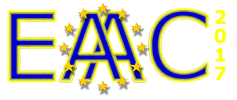Speaker
Mr
Yelong Wei
(University of Liverpool/Cockcroft Institute)
Description
Dielectric laser-driven accelerators (DLAs) utilizing large electric field from commercial laser system to accelerate particles with high gradients in the range of GV/m have the potential to realize a first particle accelerator ‘on a chip’. Dual-grating structures are one of the candidates for DLAs. They can be mass-produced using available nanofabrication techniques due to their simpler structural geometry compared to other types of DLAs. So far the dual-grating structures have been reported to improve the electron energy efficiency through geometry optimizations. Apart from optimizations, this talk proposes two new schemes to improve the electron energy efficiency for dual-grating structures. One is to introduce a Bragg reflector that can boost accelerating field in the channel, thereby generating a 70% higher energy gain compared to bared dual-grating structures. A pulse-front-tilt operation for a laser beam is proposed as a second scheme to extend the interaction length, thereby resulting in a greater energy gain by (133±32)% for a dual-grating DLA. The detailed analytical calculations and particle-in-cell simulations for both schemes will be presented in this talk. In addition, some fabrication studies for dual-gratings are also included in this talk.
Authors
Prof.
Carsten Welsch
(University of Liverpool/Cockcroft Institute)
Mr
Yelong Wei
(University of Liverpool/Cockcroft Institute)
Co-authors
Dr
Eugenio Ferrari
(Paul Scherrer Institute, Switzerland)
Dr
Guoxing Xia
(Cockcroft Institute and the University of Manchester)
Mr
Jonathan Smith
(Tech-X UK Ltd)
Dr
Micha Dehler
(Paul Scherrer Institute, Switzerland)
Dr
Nicole Hiller
(Paul Scherrer Institute, Switzerland)
Dr
Rasmus Ischebeck
(Paul Scherrer Institute, Switzerland)
Dr
Steven Jamison
(STFC Daresbury Laboratory)

